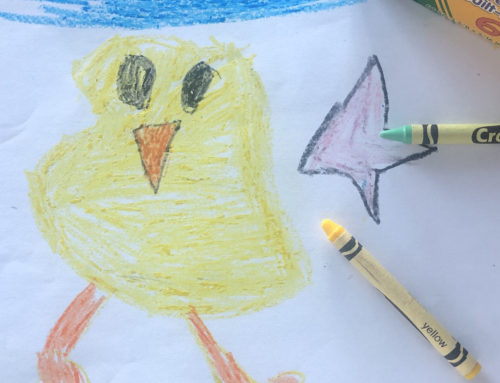
I had been lying on the couch watching a group of talking heads give their opinions of the economy, and from what I could tell, the only qualification any of them had was the ability to verbalize what rattled around in there heads. It reminded me of big family dinners where everyone spoke, and no one listened. Then Alison came home late from work with a look on her face that told me I had done something wrong, a CVS bag she was carrying came flying at me only to bounce off my chest as she marched off.
The bag contained not one but three positive pregnancy tests.
When we got pregnant with Emily, we both sat in the bathroom waiting for the stick to show two pink stripes. The excitement was electric between us with a tingle of fear for the unplanned gift. Mellissa’s announcement was a test stick wrapped in a pen box for Father’s Day. We were overjoyed both times.
I rubbed my eyes and dragged myself into our bedroom. I wanted to ask how this could have happened, but I knew. I screwed up. I was responsible for birth control. The simple version? We had run out. We had been horny. I had lied and said we were safe.
When I found her, she was pacing, an ugly sign. We just looked at each other, then I sat on the bed until she was done. After years of marriage, I had learned when to speak and when to become a mute—most days. When she was done and sat down beside me, I just held her as the silence surrounded us and listened to God laugh—another bump in the plan.
The day we went to the obstetrician and heard the heartbeat made it seem undeniably real. My emotions swung between feeling blessed and being damned.
“Do you think we will lose this baby?” Her question came out of left field while we were driving home.
“What?”
“We might lose this one.”
“We’ll cross that bridge when we get to it.” The heartbeat had been a little slow, but the doctor didn’t seem too worried.
“I think about it, you know.” She rubbed her stomach. “I think if I lose it, we won’t have this problem.” Looking out the window she continued, “but then I think if I did, I would feel guilty because I had thought such a thing.”
I pulled off the road and turned to her. “It’s just a small hitch in the plan.” She started to cry. “It’s going to be alright.”
Her next words were, “but what if . . .?” Through tears, hiccups, and sniffles, I heard her list all the problems she saw: her job, the store, money, the size of the house, and wanting to stay home. The Mr. Fix-It came out in me, and I just started listing off solutions and options. I ended with the tried-and-true statement, “We have months to figure this out.”
While she had been anticipating and trying to solve problems, I was still trying to get my head around another child. I was barely hanging on to taking care of the two we already had, but a third one that didn’t sleep and leaked everywhere? This was a twelve-pack-of-beer problem that had to wait. First, I needed to handle getting Dad to the cardiologist the next day. He had canceled the appointment three times.
This time I made the appointment and didn’t tell him. This time we just showed up. He was pissed, but I got my way. Daily dealings with manipulative little girls had finally paid off.
“Mr. Beaulieu, How are you today?” a man about my age asked as he settled on to a stool.
“How the hell do you think I am?” My father scowled. “I’m here.”
“I am sorry to hear you didn’t want to see my shining face,” the small smiling doctor said. “Let’s see if we can get you out of here quickly.” He turned towards me. “And you are?”
“Emerson. Em. I’m his son.”
“Good to meet you.” He turned back to Dad. “So let’s see what you’ve got going on.” The doctor took a quick glance at the folder he held. “Your cholesterol is high. We will need to up your—”
“I stopped taking that crap.” Dad folded his arms defensively and glared at the doctor.
“May I ask why?”
“Can’t stop you.” My old man groused; every inch of body language written with belligerence. He would have made the teenager I used to be proud.
“Why did you stop taking it?” I asked.
“I didn’t like the side effects.” He motioned to his cane. “Having enough trouble negotiating around the house. I sure as hell am not going to add dizziness to the problem.”
“Mr. Beaulieu, not taking your medication could lead to greater health issues.”
“I’m old.” Dad leaned towards him. “Every joint in my body hurts. I have to take a piss every half hour, and my eyesight is so bad I just aim and hope I hit the head.” He got up off the exam table. “I take pills for one problem, and it gives me three more.” He glared down at the man. “And what do you do but give me more pills for the symptoms your pills gave me.” Dad walked towards the door. His parting wave contradicted his polite no thank you.
I joined Dad out in the hallway. He was sitting on a bench waiting for me, leaning on his cane. When I sat down beside him, I was trying to figure out if I should support him or encourage him to go back. However, he spoke before I could make up my mind.
“My dad did a full day’s work, then went to bed one night and didn’t wake up the next morning. That was a good way to die.” He looked at me, his eyes cloudy with cataracts. “This has no dignity. There is no reason to live beyond your usefulness. It is just a racket to ease a young doctor’s guilt because dying on their watch is unacceptable.” He sighed. “Or maybe it is admitting to their own mortality.” He stood up and started to walk away then turned around. “I was supposed to go first.”
In the car I grabbed the steering wheel and broached a subject I dreaded. “Dad, do you want to go to assisted living?”
“I deserve it,” he mumbled.
“That is a big ‘no’ then.” We grinned. I could hear Mom’s voice as she quoted, “It sure is good to be understood.” Yup, those eighties’ Mormon commercials had it right.
Later that month, as Alison and I waited for the tech to arrive with the machine that would show a fuzzy picture of our newest member of the family.
“Do you think we will love this one less because it wasn’t planned?” she asked.
“What do you mean?”
“What if I resent him or her?” She picked at her shirt.
“You didn’t resent Emily because she showed up in the middle of your junior year. You had to take a year off.”
“Yah, but I had no idea what I was getting into.” Her eyes were so sad when she looked at me. “Besides, it was just us.” She turned to look up at the ceiling. “I can’t give this child the same beginning as the girls.
I was confused. “I don’t understand.”
“You know, breast feeding, unending snuggles. Sometimes at night, I would just sit and watch the girls sleep in my arms after I fed them.” She sighed, deep and sad.
“When Emily was born, I was working and going to school. I wasn’t able to help much. You had to work that crappy job at the convenience store, and your mom watched her.”
“Yah, so?” She had moved on to picking at her sweater.
“When Mellissa was born, I was traveling for work, sometimes a week at a time. I didn’t help a lot then either.”
“What is your point, Em?”
“Maybe this time I can get some of that time I missed with the girls.” She looked at me. “Maybe this is an opportunity for me to better understand what you went through.” I smiled at her. “Besides, you can have all the nighttime feedings you want.”
She rolled her eyes just as the ultrasound tech came in.
We walked out smiling with a picture of our healthy son—who I wanted to name Sonic. Unfortunately, Alison kiboshes the suggestion, and the name game began.




